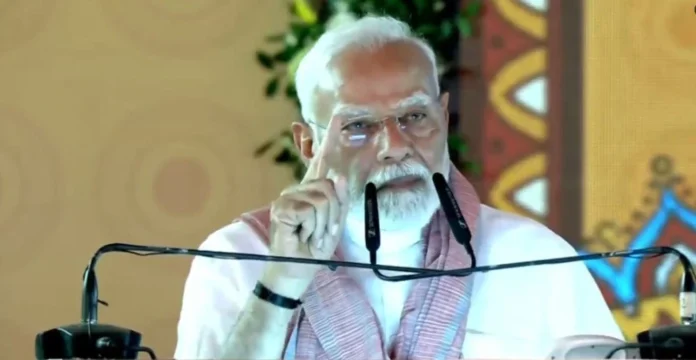By Kumkum Chadha
“From the soil of Bihar, I say to the whole world that India will identify, track, and punish every terrorist and their backers,” Prime Minister Narendra Modi declared at an election rally, just days after a terror attack in Jammu and Kashmir which claimed 26 lives.
The assault occurred in Baisaran, a remote mountaintop meadow near Pahalgam. Yet, the political tremors were felt over 2,000 kilometres away in Bihar—a state heading into a high-stakes election.
The timing of Modi’s statement drew sharp rebuke from Opposition leaders, who accused him of leveraging national tragedy for political gain. “Pulwama helped him during the Lok Sabha elections, Godhra helped him in Gujarat, and now he is using this crisis for Bihar,” charged Karnataka Congress Minister Dinesh Gundu Rao, calling Modi’s reaction a “textbook case of political opportunism”.
The pattern, critics argue, is consistent:
- In 2019, the Pulwama terror attack and Balakot airstrikes came just ahead of general elections.
- In 2002, the Godhra train fire and subsequent riots played a pivotal role in Modi’s Gujarat campaign.
Now, the Pahalgam tragedy risks becoming the centrepiece of Bihar’s election narrative.
A Shift in Tone
RJD and Congress leaders echoed Rao’s sentiment, questioning Modi’s swift pivot to campaigning amid national mourning. The RJD alleged pressure on the state machinery to ensure large turnouts at the prime minister’s rallies. At stake is not just Bihar, but the BJP’s power equation with Chief Minister Nitish Kumar and his JD(U). Despite their alliance, the BJP has conspicuously avoided naming Kumar as its chief ministerial candidate—a signal of its intent to assert dominance in state politics.
Nitish Kumar’s political journey has been marked by frequent shifts: He broke with the BJP in 2013, returned in 2017, left again in 2022, and rejoined the NDA last year. While some hail his adaptability, others view it as a credibility crisis.
On the ground, Kumar is seen as diminished—plagued by whispers of erratic behaviour and fading appeal. Yet his legacy of women-centric schemes may still yield dividends. These include:
- Distribution of nine million bicycles to schoolgirls.
- Insurance and education schemes for women.
- The controversial alcohol prohibition law, credited with reducing domestic violence.
BJP’s Calculated Strategy
The BJP’s electoral calculus is clear: gain supremacy without alienating Kumar. His influence over Kurmis, Extremely Backward Classes, and non-Yadav OBCs remains crucial. So does his reputation for clean governance. Yet the underlying ambition is unmistakable—to dominate state politics and reduce JD(U) to a junior partner.
New entrants like Aap Sabki Aawaz, former IPS officer Shivdeep Lande’s Hind Inquilab Party, and others add spice to the mix. But none, barring the RJD-Congress-Left alliance, pose a serious threat—unless they find traction on ground.
Terror As Electoral Currency
Had the Pahalgam attack not happened, the NDA may have faced a tighter contest. But in the current political climate, national security has overtaken local issues. The BJP is poised to project Bihar’s election as a referendum on who can keep the country safe.
Modi’s strongman image, coupled with the optics of a swift and resolute response to terror, will form the core of BJP’s messaging. In doing so, development and welfare schemes will ride piggyback on heightened patriotic sentiment.
The Big Picture
In this evolving narrative, the question for Bihar voters will shift from “who will govern the state?” to “who will keep India safe?” For the BJP, that question has a clear answer: Narendra Modi.
Whether voters buy that narrative will decide not just Bihar’s future, but the shape of coalition politics in India.
—The writer is an author, journalist and political commentator


